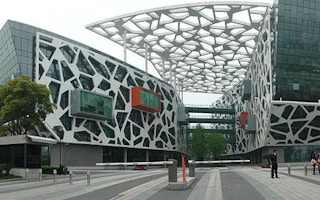China’s 1.37 billion people, many of them fully connected to the Internet, use an enormous amount of energy as they email, search the Web, or stream video. Indeed, the Chinese government estimates that the country’s data centres alone consume more electricity than all of Hungary and Greece combined.
With China’s electricity produced mainly from coal, every WeChat message Chinese citizens send helps to speed up global warming. Meanwhile, a large amount of water is being used to cool data centres, further exacerbating shortages in this already water-stressed nation.
But as Chinese technology and Internet businesses look to burnish their environmental credentials and lower costs of operation, many are working to reduce electricity and water usage at their massive computing facilities. The data centres are installing energy-efficient equipment and water-saving cooling towers, as well as making fundamental design changes in data centres to cut energy demand.
In Hangzhou, next to eastern China’s Qiandao Lake, the e-commerce giant Alibaba Group has developed a data centre tapping natural water bodies for cooling — the first of its kind in the nation. By using water from the lake to cool servers, Alibaba has been able to stop employing mechanical chillers for most of the year. The water then flows through a 1.5-mile-long canal until the water temperature drops and returns to the lake with minimal impact.
Technicians at the Alibaba facility also monitor heat output of individual servers and provide cooling only if necessary. The company says both efforts have enabled the data centre to use 80 per cent less energy compared with conventional methods. “Chinese data centre players in recent years have begun to take energy conservation seriously,” said He Chunhua, the secretary-general of Beijing-based China Green Data Centre Advancing Federation. Her organisation has already attracted dozens of companies to join the group, He Chunhua said.
In the United States, technology giants Microsoft, Google, and Amazon have emerged as leaders in the field of making giant data centres more efficient and powering them with renewable energy. Microsoft’s operations have been 100 per cent powered by renewable energy since 2014, either by purchasing the alternative energy or by generating it, as it does using 2,200 solar panels on its Silicon Valley campus.
Google is aiming to power its data centres and other operations entirely with renewable energy, and so far has contracted with alternative energy suppliers to buy more than 2.2 gigawatts of electricity. Amazon is building wind farms to power its data centres and other operations, has set a renewables goal of 100 per cent, and by the end of this year is hoping to power its infrastructure using 40 per cent renewables.
“
Chinese data centre players in recent years have begun to take energy conservation seriously.
He Chunhua, secretary-general, China Green Data Centre Advancing Federation
No one knows exactly how many green data centres exist in China, partly because the country doesn’t have a clear definition of what a green data centre is. But anecdotal evidence suggests computing facilities with smaller environmental footprints are growing in popularity.
Last year, China’s Ministry of Industry and Information Technology launched the country’s first green data centre pilot program. Among 84 participants are Chinese banks, factories, telecommunications firms, and even the Prison Administrative Bureau in the northern China city of Harbin.
Yang Peijun, the director of Shenzhen-based Pacific Business Solutions, said that as a data centre operator, his company’s chief goal is “to strengthen information technology infrastructure.” However, he said that the government also is now insisting on greater environmental accountability. “The two somewhat conflicting responsibilities have left us no choice but to optimise our operation,” said Yang.
To do so, Pacific Business Solutions has been taking part in the government’s pilot program, which enables the company to compare notes with others in the industry and develop higher environmental and efficiency standards.
While the Chinese central government has yet to cap the amount of electricity and water that domestic data centres can use, some cities have made it clear that they don’t welcome water-intensive, energy-guzzling computing facilities.
Beijing, for one, has drawn a red line on the energy efficiency of data centres, and any centre with a power usage effectiveness rating above 1.5 is not allowed to operate there. (Most data centres in China have a rating of 2.2) He Chunhua said that Beijing’s restrictions have already forced some companies to leave the city.
This story was originally published by Chinadialogue under a Creative Commons’ License and was republished with permission. Read the full story.

















